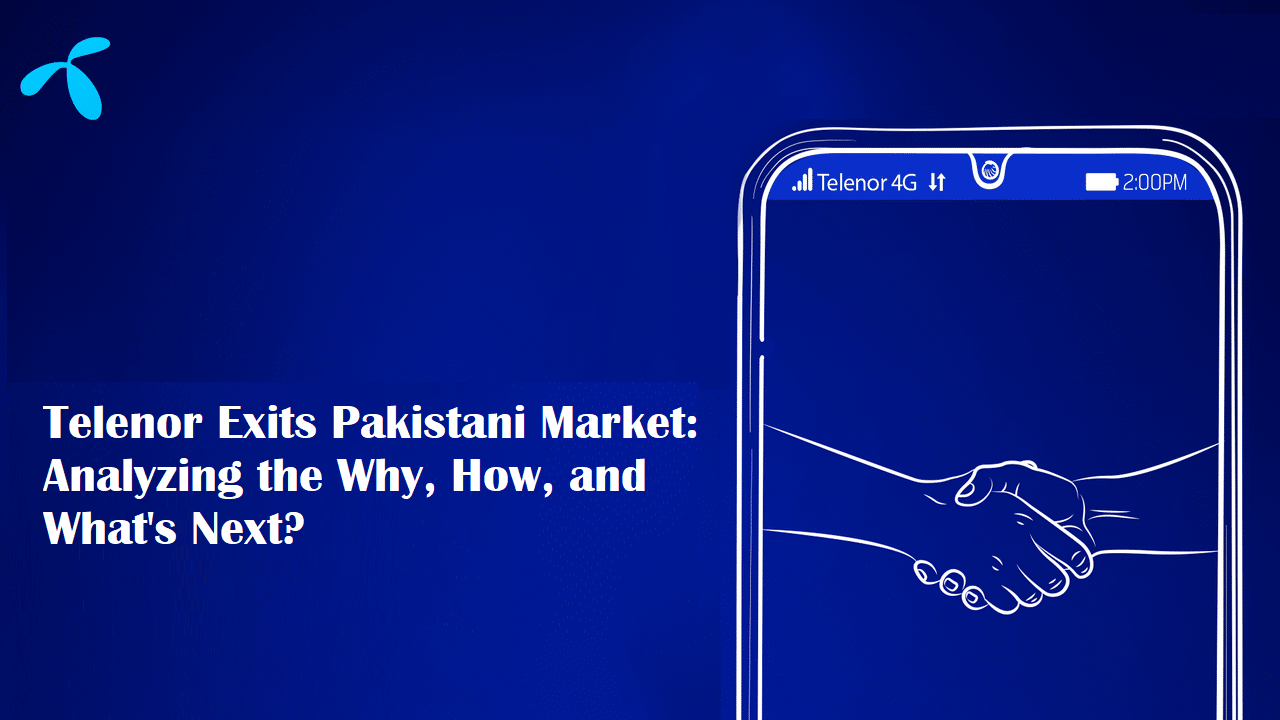Telenor Exits Pakistani Market: Analyzing the Why, How, and What’s Next?

The recent finale of Telenor’s sale of its entire stake in Telenor Pakistan to Pakistan Telecommunication Company Limited (PTCL) marks a key moment in the Pakistani telecom sector. Experts assert that Telenor’s exit from Pakistan is an element of the company’s broader strategy to withdraw from the Asian market and concentrate on the European market. However, due to its broad consequences for the sector, this action necessitates a comprehensive analysis of the elements that led to Telenor’s exit from the Pakistani market. So, let’s analyze the intricacies of Telenor’s decision and the broader implications it carries, shedding light on the dynamics shaping the telecom landscape in Pakistan.
Where has Telenor fallen short?
Since its entry into the Pakistani market in 2005, Telenor has amassed an estimated 45 million customers in the country. Nevertheless, the operations in a fiercely competitive market and the consistent decline in Average Revenue Per User (ARPU) brought about by the emergence of over-the-top (OTT) services presented enormous challenges. Telenor’s strategy of targeting the low-income rural population, while successful in building a substantial consumer base, faced setbacks when coupled with the acquisition of the 850 MHz spectrum for 3G/4G services. The investment failed to generate the expected return due to the requirement for relatively expensive devices, which were beyond the affordability of Telenor’s primary user base.
Telenor’s strategy of targeting the low-income rural population, while successful in building a substantial consumer base, faced setbacks when coupled with the acquisition of the 850 MHz spectrum for 3G/4G services
The Regulatory Environment’s Role
Telenor had the potential to recover from its operational missteps by recalibrating its market strategy, like Ufone’s strategic adjustments. In part, Ufone’s lackluster performance can be attributed to its delayed entry into the 4G market, which resulted in a substantial decline in market share. Despite the introduction of 4G services in 2019, Ufone faced challenges since rivals had already captured a significant portion of the market, thereby affecting its high-value customer base. However, Ufone demonstrated resiliency through the implementation of alternative tactics, including spectrum refarming, to maintain competitiveness. Telenor, despite its missteps, had the potential to navigate the challenges, but unfortunately, the stringent and less accommodating regulatory environment aggravated the situation.
Telenor, along with other telecom companies, actively advocated for policy interventions to enhance the industry’s health and safeguard operational viability. Its representatives frequently convened with government officials to express industry concerns. However, these warnings about the formidable challenges related to the regulatory environment remained unaddressed. Telenor Pakistan has encountered arbitrary assessments, inappropriate tax regulations, suspended bank accounts, and penalties from regulatory authorities over the past few years. Similar to other telecommunications companies in the industry, Telenor encountered difficulties concerning the rationalization of spectrum and license fees. For example, Telenor encountered difficulties with license renewal fees, which it initially contested in the Supreme Court but received an unfavorable ruling. In addition, the deteriorating macroeconomic environment contributed to Telenor’s decision to write off $250 million of its Pakistani operations during the second quarter of its fiscal year 2022. These challenges, coupled with an increased cost of capital resulting from interest rate hikes, an increased cost of business, and a deteriorating political and economic climate, made it increasingly impractical for Telenor to sustain its operations in Pakistan.
Telenor, along with other telecom companies, actively advocated for policy interventions to enhance the industry’s health and safeguard operational viability
What does it mean for Ufone?
The acquisition of Telenor by PTCL marks a transformative opportunity for Ufone, ushering in growth, enhanced competitiveness, and operational efficiency in the Pakistani telecom sector. Ufone’s subscriber base is anticipated to surpass 70 million following the merger, thereby consolidating its standing as a significant rival in the telecommunications industry at the national level. It also grants Ufone access to Telenor’s extensive tower network, comprising over 20,000 towers, thereby enhancing infrastructure, coverage, and network efficiency.
Furthermore, the utilization of adjacent spectrums held by both Ufone and Telenor brings about spectrum synergies that promise increased bandwidth, improved network capacity, enhanced service coverage, and superior interference management. Which will consequently deliver higher data speeds and accommodate a larger user base. With PTCL’s strong financial foundation, the merged entity will provide Ufone with the necessary resources to fund investments in network infrastructure, service improvements, and technological advancements. This will ensure the company’s long-term sustainability and growth.
The acquisition not only cultivates a favorable market perception but also establishes the amalgamated organization as a more formidable and competitive player in the telecommunications sector. Creating a favorable perception is critical for both attracting and retaining customers, as well as building confidence among stakeholders.
A Lesson for the Pakistani Government
Given the prevailing trend of mergers and acquisitions, PTCL’s recent acquisition of Telenor might appear to be an ordinary event. However, a deeper examination of this transaction, considering the prevailing conditions in Pakistan’s telecom industry, raises concerns and offers a lesson for the government. Telenor’s exit from the Pakistani market echoes a pattern observed in the departure of other international telecom players, such as Warid, Qatar Telecom, and Oman Telecom. These exits raise questions about the attractiveness of the Pakistani market for foreign investors.
The underlying issue appears to be the regulatory framework governing the telecom sector. International telecommunications companies have frequently departed from Pakistan due to the unfavorable regulatory environment.
To safeguard the confidence of investors and maintain the interest of global telecommunications companies, it is imperative that the Pakistani government rectify the flaws within its regulatory framework. Ensuring a more stable, transparent, and business-friendly regulatory framework is crucial for the telecom sector to effectively attract and retain foreign investments. This encompasses the dual objectives of optimizing tax regulations and establishing a regulatory framework that is both foreseeable and conducive to growth. Furthermore, a deliberate and comprehensive approach should be taken to actively involve industry stakeholders, gain insight into their concerns, and work together to develop policies that promote expansion, innovation, and long-term sustainability. Promoting a proactive and investor-friendly regulatory environment is of utmost importance to avert additional withdrawals and incentivize fresh investments that can positively impact the development of the telecommunications sector in Pakistan.
The coming years will undoubtedly shape the future dynamics of the Pakistani telecom industry.
PTA Taxes Portal
Find PTA Taxes on All Phones on a Single Page using the PhoneWorld PTA Taxes Portal
Explore NowFollow us on Google News!





